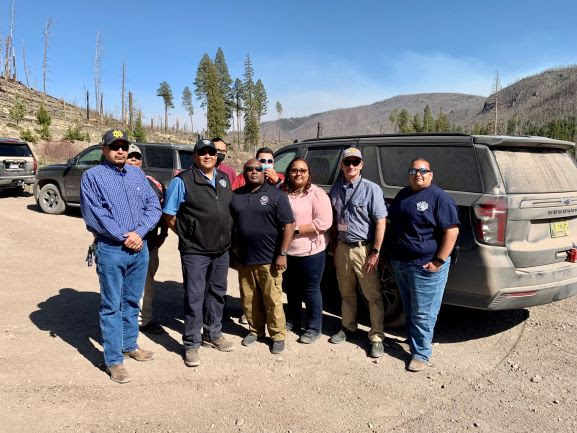
- Details
- By Kelsey Turner
As two combined wildfires flare across New Mexico, Federal Emergency Management Agency (FEMA) Deputy Administrator Erik Hooks met with the state’s emergency management and tribal leaders to discuss wildfire response and ongoing recovery efforts.
In the dry, windy New Mexico climate, about 70% of the state’s population is at elevated risk of wildfires, according to States at Risk. Wildfires just this year have burned over 230,000 acres of land in New Mexico, the Southwest Coordination Center found.
Hooks met with tribal leaders from Santa Clara Pueblo, Santo Domingo Pueblo, and Pueblo of Santa Ana. He traveled with these leaders to visit FEMA mitigation projects meant to address flood control and wildfire prevention, a FEMA press release stated.
Hooks also spoke to Acting Secretary of the Department of Homeland Security and Emergency Management Diego Arecon. They talked about the state’s four declared grants received through FEMA’s Fire Management Assistance Grant Program, a disaster assistance program that helps with mitigation, management and control of fires, according to a press release.
“I enjoyed discussing FEMA’s support and ongoing partnership opportunities with state and tribal leaders” Hooks said in the press release. “Wildfire mitigation, as well as preparedness and readiness efforts were priority topics, along with how FEMA can continue to better support underserved communities across both the state and the nation.
Thousands of New Mexico residents have been evacuated as the combined wildfires continue spreading. More than 145,000 acres had been burned by Tuesday morning, CNN reported.
More Stories Like This
Klamath Indigenous Land Trust Purchases 10,000 Acres as Salmon ReturnTrump signs law that revokes some limits on drilling in Alaska’s National Petroleum Reserve
Southern Sierra Miwuk Nation Gets 900-Acres ofLand Back
Chilkat Indian Village Tells New Palmer Mine Owners They Are “Not Welcome” in Chilkat Valley
Tribes, Coastal Group Ask Army Corps to Revoke Permit for Texas Export Terminal
Help us defend tribal sovereignty.
At Native News Online, our mission is rooted in telling the stories that strengthen sovereignty and uplift Indigenous voices — not just at year’s end, but every single day.
Because of your generosity last year, we were able to keep our reporters on the ground in tribal communities, at national gatherings and in the halls of Congress — covering the issues that matter most to Indian Country: sovereignty, culture, education, health and economic opportunity.
That support sustained us through a tough year in 2025. Now, as we look to the year ahead, we need your help right now to ensure warrior journalism remains strong — reporting that defends tribal sovereignty, amplifies Native truth, and holds power accountable.
 The stakes couldn't be higher. Your support keeps Native voices heard, Native stories told and Native sovereignty defended.
The stakes couldn't be higher. Your support keeps Native voices heard, Native stories told and Native sovereignty defended.
Stand with Warrior Journalism today.
Levi Rickert (Potawatomi), Editor & Publisher

